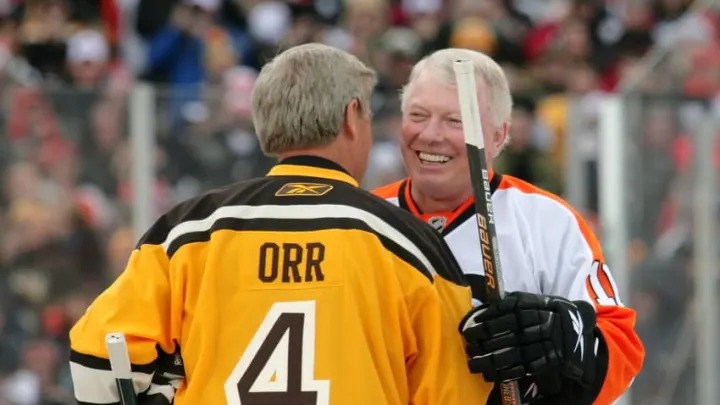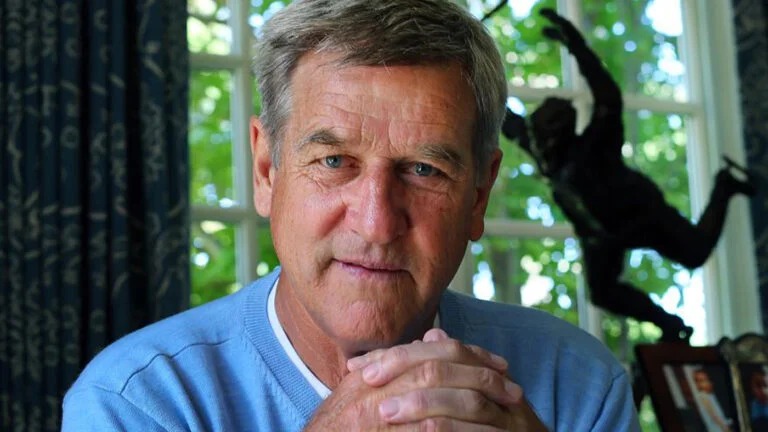
BOSTON BRUINS LEGEND BOBBY ORR CROWNED NHL’S GREATEST OF ALL TIME
BOSTON, MA – May 28, 2025 – In a decision that will resonate through the annals of hockey history, legendary Boston Bruins defenseman Robert Gordon Orr has been officially named the National Hockey League’s “Greatest of All Time.” The announcement, the culmination of extensive deliberation by a panel of hockey experts, historians, and former players, solidifies Orr’s unparalleled legacy in the sport, placing him above a distinguished list of contenders including Peter Forsberg, Mark Messier, Mario Lemieux, and Maurice Richard.
The voting process, meticulous and comprehensive, weighed statistical dominance, individual accolades, impact on the game, and team success. While each finalist presented an irrefutable case for their own greatness, Orr’s revolutionary approach to the defenseman position, combined with his extraordinary achievements and transformative influence, ultimately set him apart.

Robert Gordon Orr, born March 20, 1948, in Parry Sound, Ontario, joined the Boston Bruins in 1966. What followed was a career that redefined the role of a blueliner. Before Orr, defensemen were largely confined to their own end, focusing on shutting down opposing offenses. Orr, however, possessed a rare blend of speed, offensive instincts, and defensive prowess that allowed him to control the game from end to end. He was a pioneer, transforming the position into an offensive weapon, regularly leading rushes and becoming a primary scoring threat.
His trophy cabinet tells a story of unparalleled individual brilliance. Orr remains the only defenseman in NHL history to win the Art Ross Trophy as the league’s leading scorer, a feat he accomplished twice (1969-70 and 1974-75). He also holds the record for most points and assists in a single season by a defenseman. His eight consecutive Norris Trophies, awarded to the league’s best defenseman, from 1968 to 1975, is a testament to his sustained excellence and dominance at his position. Beyond that, he captured the Hart Memorial Trophy as the league’s Most Valuable Player three consecutive times (1970, 1971, 1972) and the Conn Smythe Trophy as playoff MVP twice (1970, 1972).

But Orr’s impact extended beyond individual accolades. He single-handedly revitalized a struggling Boston Bruins franchise. Before his arrival, the Bruins hadn’t won a Stanley Cup since 1941 and had missed the playoffs for seven straight seasons. With Orr at the helm, the Bruins became a dynasty, winning the Stanley Cup in 1970 and 1972, with Orr famously scoring the iconic overtime winner in 1970, a moment immortalized in one of hockey’s most celebrated photographs.
His career, though tragically cut short by persistent knee injuries at the age of 30, was a dazzling display of skill, vision, and determination. He retired with 270 goals and 645 assists for 915 points in just 657 NHL games, still holding several records for defensemen. He was inducted into the Hockey Hall of Fame in 1979, with the standard three-year waiting period waived, making him the youngest inductee at 31 years of age.
The other finalists were undeniably titans of the sport, each leaving an indelible mark on the NHL:
Peter Forsberg: The Swedish maestro of the Colorado Avalanche, Forsberg was a complete player, renowned for his incredible vision, physical play, and clutch performances. A two-time Stanley Cup champion with the Avalanche, he won the Hart Trophy and Art Ross Trophy in 2003, showcasing his dual threat as a scorer and playmaker. His fierce competitiveness and ability to elevate his game in crucial moments made him a formidable opponent.
Mark Messier: “The Messiah” was the embodiment of leadership and clutch performance. A six-time Stanley Cup champion, including five with the Edmonton Oilers and one as captain of the New York Rangers, Messier was known for his raw power, offensive prowess, and unparalleled ability to inspire his teammates. He remains the only player in NHL history to captain two different teams to the Stanley Cup, a testament to his immense impact.
Mario Lemieux: “Super Mario” was arguably the most naturally gifted offensive player of his generation, possessing a unique blend of size, skill, and creativity. Despite battling Hodgkin’s lymphoma and numerous injuries, Lemieux led the Pittsburgh Penguins to back-to-back Stanley Cups in 1991 and 1992. His return to the game after his initial retirement to save the Penguins franchise as an owner and then as a player is the stuff of legend. He dominated scoring titles and consistently showcased an incredible points-per-game average throughout his career.
Maurice Richard: “The Rocket” was a scoring phenom who electrified the Montreal Forum for 18 seasons. The first player to score 50 goals in 50 games and the first to reach 500 career goals, Richard was a trailblazer who inspired a generation of French-Canadian hockey players. His fiery passion and relentless drive to score made him a feared presence on the ice and a cultural icon.
While the arguments for each of these legends are strong and their contributions to the game undeniable, the panel ultimately determined that Bobby Orr’s transformative impact on the sport, his unprecedented statistical dominance as a defenseman, and his ability to lead his team to multiple championships in a short, yet brilliant, career solidified his position as the “Greatest of All Time.” His legacy continues to inspire generations of hockey players and fans, a true testament to the genius of Robert Gordon Orr.
Leave a Reply